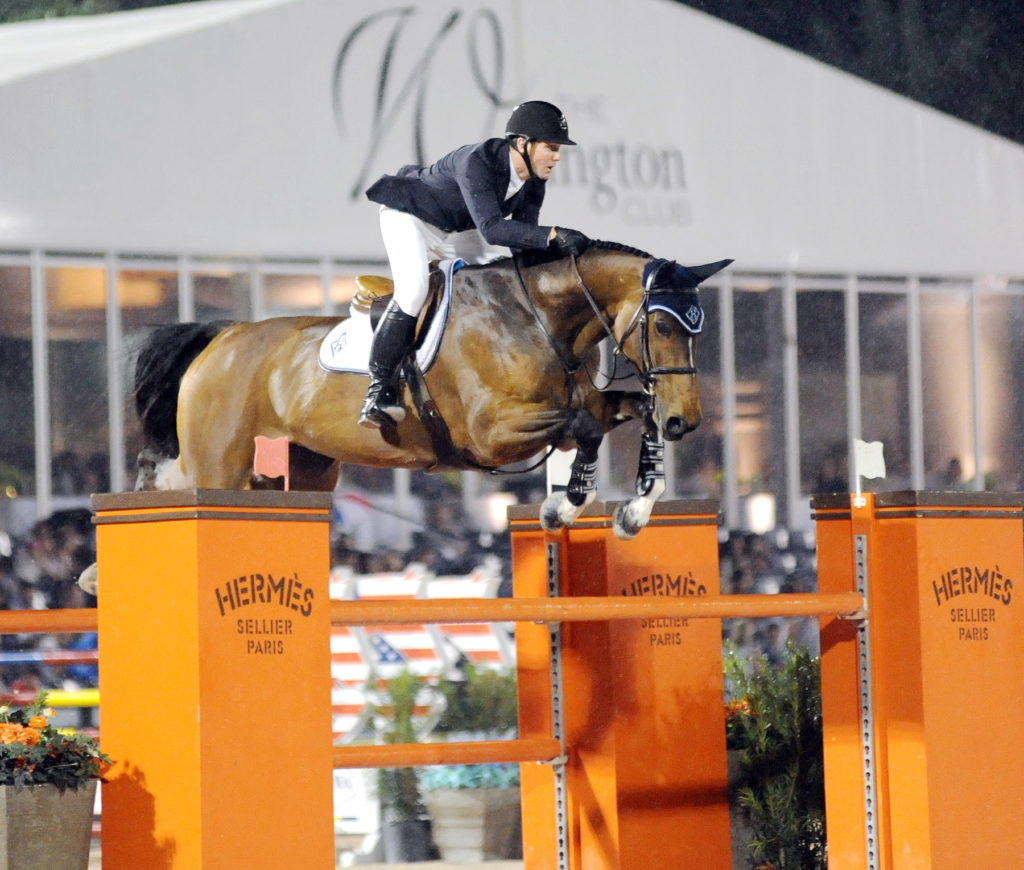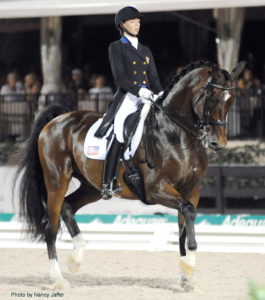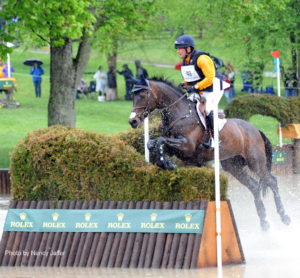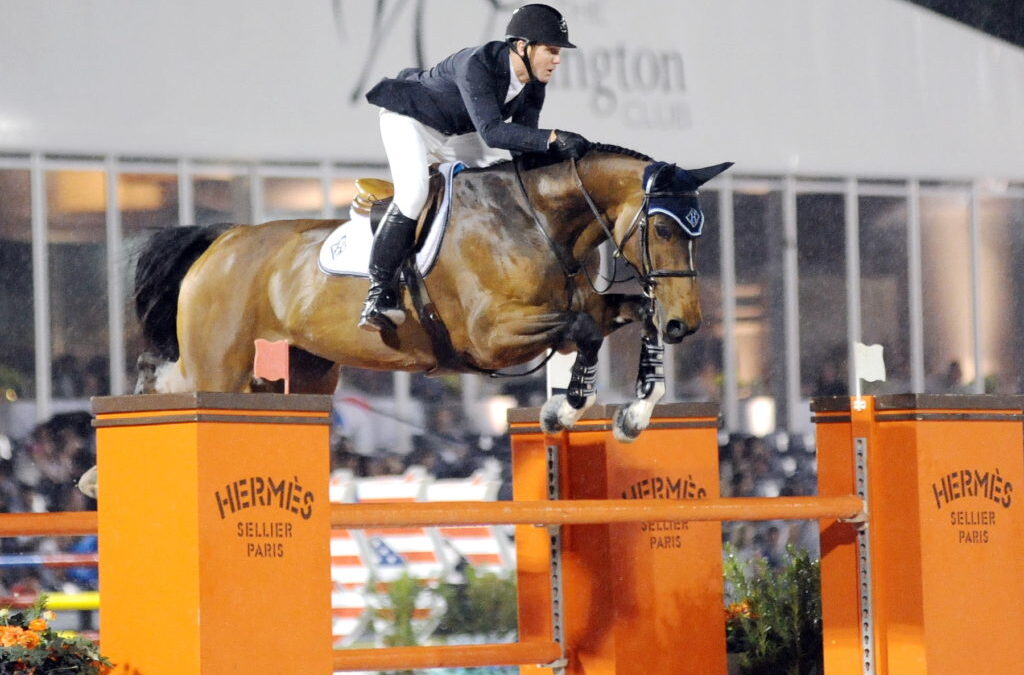By Nancy Jaffer
July 3, 2016

McLain Ward and HH Azur are leading the U.S. show jumping team to Brazil. (Photo copyright by Nancy Jaffer)
Impressive! That’s the reaction prompted by the announcement of the U.S. Olympic equestrian squads. It’s the most promising group of American athletes headed to the Games since 2004, when the country brought home five medals across the three disciplines, including a team gold in show jumping.
The low point was the 2012 London Olympics, when there were no American equestrian medals for the first time since the 1956 Olympics. That puts on extra pressure for 2016. But through intensive development, training and fundraising efforts, jumping, dressage and eventing teams have emerged that could earn a place on the podium in Rio.
All three coaches are optimistic, without going overboard. As eventing coach David O’Connor noted, “It’s sport, and you never know really what’s going to happen.”
But the U.S. has more depth in all the disciplines than it has enjoyed in years.
It has been said the country could field two successful show jumping teams in Brazil. That was the same assessment bandied about before the 1984 Games in Los Angeles, where the team took gold while Joe Fargis and Conrad Homfeld accounted for the individual gold and silver.
Show jumping coach Robert Ridland is fortunate to know his contingent extremely well– he led the same riders to a team bronze at the 2014 Alltech FEI World Equestrian Games. From my sidelines vantagepoint, I saw this one coming, telling Robert several weeks ago an encore for the 2014 team seemed likely to me. Protocol meant he was not allowed to comment, but I remained confident.
It seemed fairly obvious. Can you imagine an Olympic team without two-time Olympic team gold medalist McLain Ward, who rose to number one in the world rankings last month? Especially since he rides the spectacular HH Azur, winner of the grand prix in Rome last month against the world’s best?
With Rothchild, Ward was fifth at the WEG, missing the “Final Four” by one spot.
“He set the bar pretty high,” said Ridland, noting that this time, “you probably would say he is in a stronger position. We’re pretty excited about that.”
And what about Beezie Madden, Ward’s teammate on the Olympic gold medal squads, with an individual Olympic bronze to her credit? She also came home with an individual bronze from her trip to the WEG with Cortes C. You couldn’t leave her off the team.
Kent Farrington, the second-highest-placed U.S. rider at number six on the international roster, has had vast success with Voyeur. Lucy Davis, the rookie of the 2014 WEG squad, “made a pretty big statement,” as Ridland put it, during two Olympic observation events with six fault-free trips in seven rounds on Barron. Two years on, and with the WEG experience behind her, she has more to offer the team than she did in 2014.
“We’ve got four really strong horse/rider combinations,” Ridland observed.
Show jumping has the greatest number of countries that could be medal possibilities. In addition to the world champion Dutch, the Germans always are a threat and France can be impressive. The British, gold medalists in 2012, are without two of that squad’s powerhouse horses that made gold happen. Team member Scott Brash, who has been number one in the world, isn’t playing because two of his mounts are out of action.
Other squads with possibilities include Ukraine (composed of riders from outside its borders), Switzerland, Sweden and Quatar with its high-priced horses. Brazil has the incentive to do well at home, but it’s a longshot.
It will be interesting to see how the U.S. team does against many of the major players when it takes the field for its last big prep at Aachen, Germany, July 12-17.
None of the Olympic dressage team horse/rider combinations are on the 5-star squad for Aachen, with the exception of alternate Shelley Francis (Doktor). Steffen Peters will ride Rosamunde, who is the direct reserve for Legolas in Rio.
Meanwhile, Olympic combos Peters with Legolas and Kasey Perry-Glass (Goerklintgaard’s Dublet) will appear in the 4-star at Aachen.
Neither Laura Graves (Verdades) nor Ali Brock (Rosevelt) are competing at the German show.
Explaining why, coach Robert Dover said of Laura, “She is so on it now and having won her last class in Rotterdam (the final observation trial) with such a high score (77.314 percent) and feeling so confident, then what we’ll do are several dress rehearsals between now and the Olympics. She didn’t need to do another show.”

Laura Graves was a star with Verdades in the run-up to Rio. (Photo copyright 2016 by Nancy Jaffer)
As for Brock, who had done two of the three competitions for team aspirants in the Netherlands, Dover said, “everything she does is pretty mistake-free, and for her, it’s really just about having all the expression and the feeling of electricity, so we didn’t feel she needed to go out again.”
As for Peters’ particpation, Dover observed, “Steffen loves Aachen. He’s had such great shows there. Both of his two horses are still evolving into better animals, with more quality every time I see them. I never second-guess Steffen.”
Dover enthuses about his group, most of whom have been in Europe for two months, “It’s the most wonderful crew of human beings. They’re like a family together. They’ve been this way from the winter on. They support each other at home, they support each other. They were supporting each other when they were competing against each other for these cherished team spots. As a coach, you can’t want more than that. It was very heartwarming.”
Team spirit is important, as Dover observed.
“What I love is that we’re going in as a team that is renowned now as being a contending team. On any given day, just like with the jumpers, there’s going to be that team that has the luck of the day and has done all their homework.
“We know that the Germans are very strong; we know that the British, if (defending Olympic titleist) Valegro is at his very best, is a hard team to beat as well. And we know that the Dutch are very strong. But I think they are saying the same things about America right now. That’s always the nice way to go into an event.”
The German team will be announced at Aachen, and no doubt it will be a contender for gold in Rio; Germany has three of the top four combinations in the world rankings. The Dutch won’t be at Aachen; their national championship is at the same time.
It will be interesting to see what happens with Edward Gal, who is supposed to ride Glock’s Voice at the championship. He has had a checkered year, with physical problems for both himself and his horses. But even without him, the Netherlands edged the U.S. last month at Rotterdam in the team competition.
Great Britain, which won gold at the 2012 Olympics in London, has the record-holding Valegro with Charlotte Dujardin, but the two haven’t competed since last summer’s European Championships. Her trainer and mentor, Carl Hester, is the top-ranked British rider at number 10 with Nip Tuck, and Fiona Bigwood recently moved up to number 14 with Aaterupgaards Orthilia, so they’re in with a good chance. Sweden could be in contention for a medal, while Spain has number two-ranked Beatriz Ferrer-Salat with Delgado, but no one else in the top 50.
Eventing is always the most unpredictable discipline to figure, because one misstep on cross-country can ruin a team’s medal chances. But anyone who bets against Germany this time would be foolish. With defending Olympic champion Michael Jung, the world number one, leading the way (he said his choice to ride in Rio is Fischer Takinou) and world champion Sandra Auffarth right behind him, Germany is the solid gold medal favorite.
Great Britain (which names its team Tuesday) is more of a question mark than usual because its pillar, William Fox-Pitt, has come back from a horrific accident that left him out of the action for many months. France is a nation on the rise and also looks like medal material. New Zealand is a threat, even without its longtime star, Andrew Nicholson, and with Tim Price as a reserve instead of on the team itself following an injury to his top horse. You can never count out Australia, either.
O’Connor can take comfort in having a deeper well from which to draw than usual, and top riders with several options. Phillip Dutton, world number three, is on the squad with Fernhill Cubalawn, but he also has Mighty Nice and Fernhill Fugitive as direct reserves in case of adversity.

Phillip Dutton was named to the team with Fernhill Cubalawn and two other direct reserves. (Photo copyright 2016 by Nancy Jaffer)
Boyd Martin, number seven in the world, was named with Blackfoot Mystery, but Welcome Shadow (second in the CCI 3-star at the Jersey Fresh International) is a direct reserve. World number 11, Lauren Kieffer (Veronica, and Meadowbrook’s Scarlett as direct reserve) is joined by British-based Clark Montgomery with Loughan Glen. Reserve rider Maya Black (Doesn’t Play Fair) is young but steady.
O’Connor, who like Ridland and Dover took over the coaching job following the disappointing 2012 Games, puts it this way: “The ship has turned. Now we’re just working on getting some speed up on the ship. The nice thing is that a couple of the more experienced guys have multiple horses. We’ve got some new people coming in that have been out there and gotten some experience under their belts,” said O’Connor, including Kieffer in that group.
He noted that an important plus in this group is the fact that “Morale is high, for each other; not for just one person. Attitude is really important. Everybody feels like there’s a lot of confidence.”
This team is characterized by hard-working doers and achievers with the right attitude for success.
“The one thing you really can’t teach is that twist that you want to be a champion and you can produce horses that way,” O’Connor said. “That internal drive, you can support it, but you’ve got to come with that desire.”
From the big picture perspective, Rio is looking like a very problematic Games. You’ve heard about the crime, the unfinished venues, the transportation links that still need work. A little more than two weeks ago, the state of Rio de Janeiro declared a “state of public calamity.” The governor said a financial crisis could bring about “a total collapse in public security, health, education, mobility and environmental management.”
Police and firefighters who hadn’t been paid were greeting arrivals at the Rio airport last week with a sign that that read, “Welcome to hell.”
Meanwhile, 150 prominent doctors, bioethicists and scientists from around the world asked for the Olympics to be moved or postponed because of the Zika epidemic, though it is expected that since it will be winter in Rio (seasons are opposite below the equator) less mosquitoes will be around to carry the disease.
But the coaches are undaunted. Actually, the equestrian venue at Deodoro, where the 2007 Pan American Games were held, is in decent shape compared with the locations for several other sports.
Dover notes people worried that the infrastructure for the 2004 Games in Athens wouldn’t be finished in time, but it was. The six-time Olympian said that in his experience as a rider, there were concerns about every Games, except the 1984 competition in Los Angeles, yet all turned out well.
“In all probability,” he contends, “we’ll look back and say the competition and venue ended up being as fine as the previous games.
“It’s going to be fine,” Ridland agrees.
“We’ve got a job to do, we’re going there and that’s what the deal is.”
This column was revised at 10:20 a.m. on July 4, 2016.




